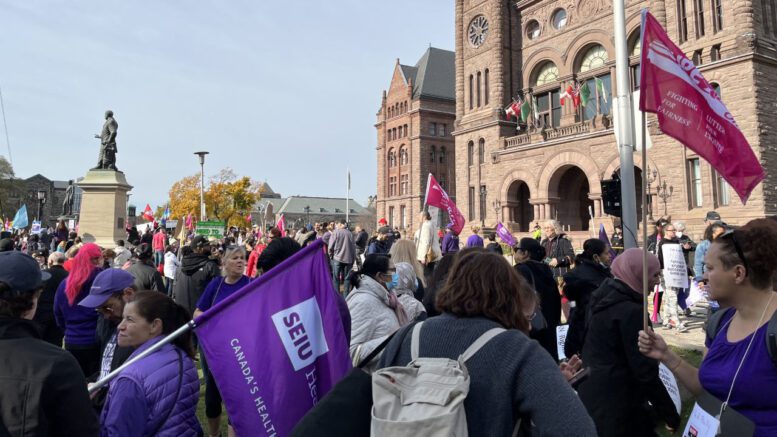Ontario schools boards are finding alternatives for in-person learning as CUPE education workers went on strike Friday, despite the provincial government passing legislation to make their strike action illegal.
Using the notwithstanding clause, the provincial government overrode the Canadian Union of Public Employees (CUPE) education workers’ right to collective bargaining, imposing a contract that did not meet their proposed increase, and which made
On Friday, however, CUPE education workers staged a strike and, along with supporters throughout Ontario, picketed and protested the Ontario government’s decision to invoke the notwithstanding clause.
“These are custodians, EAs (educational assistants), ECEs (early childhood educators), they do very important work,” said Angela Kennedy, Toronto Catholic District School Board trustee of Ward 11 East York-Toronto, as well as Chair of the Toronto Catholic District School Board.
“They’re the foundation of our school board and if we don’t have them in the schools, then the schools can’t operate.”
As a result, public schools with CUPE employees are closing during the strike action. In the Toronto District School Board, students not enrolled in virtual learning will be given work to complete from home, and in the Toronto Catholic District School Board, effective Monday, students will be moved to remote learning.
Both boards said that third-party daycare options will be available, though the TDSB will provide an update on daycare services if the strike continues into next week.
The notwithstanding clause was invoked when CUPE signalled their intention to strike after they and the provincial government were unable to come to an agreement on a new contract. CUPE was asking for an annual wage increase of 11.7 per cent for all CUPE education workers, but the provincial government was offering a two per cent increase for those earning under $40,000 and 1.25 per cent for those earning over $40,000.
Mai-Liis Tammemagi is a parent who has two children at R.H McGregor Elementary School in East York, one of whom is a child with autism and depends on help from CUPE education workers.
“The person that works with my son every day … is like a lifeline to my family,” Tammemagi said. “He goes above and beyond every single day to try to support my child. If he wasn’t at the school, my child wouldn’t be in school.”
Tammemagi said that learning from home would be difficult as it would disrupt her son’s routine, but that she supports CUPE workers in their strike.
“Seeing [Minister of Education] Stephen Lecce talk about how it’s so important to keep kids in the classroom, but not talking about the incredible work these staff members do, really frustrates me,” Tammemagi said.
“If they wanted to keep students in the classroom, all they had to do was come up with the funding to support these super important workers that have every right to their wage increase.”
Stephanie Radcliffe is another parent with two children at R.H McGregor Elementary School, and said she had heard nothing but support for CUPE education workers.
“I certainly talked to other parents when there was the other strike action that was happening before the pandemic, and there were some people who were less sympathetic,” she said. “This time I feel like it’s really different.
“I haven’t spoken to any parents who are on the government’s side on this one … these are the people that take care of our kids, these are the people that help them when they have a scraped knee, when they need extra support in class, these are people that as working parents we really rely on.”
Radcliffe said she is lucky in that she can make arrangements for her children if there is no school on Friday, but is worried that low-income parents and CUPE workers with children may be unable to do the same.
The Keeping Students in Class Act
In response to the government using the notwithstanding clause to legislate The Keeping Students in Class Act, CUPE did not back down and instead said they would continue supporting their members in their strike action.
“This is an appalling display of contempt for workers’ rights, for the collective bargaining process, and for the workers who look after our kids and keep our schools running,” said CUPE National President Matt Hancock in a news release on Monday. “And to our members: you are not alone. You have the full force of Canada’s largest union and our 715,000 members nationwide standing with you. We have your back.”
Rafael Gomez, an associate professor of employment relations at the University of Toronto, believes that using the notwithstanding clause to override the right to collective bargaining is a “slippery slope.”
“It’s dangerous when you start to take away independent actors and independent institutions in a society, and collective bargaining is one of those institutions that allows for the conflict that exists in the employment relationship to be channeled in some productive way,” Gomez said.
While CUPE cannot fight the legislation, Gomez said they can still maintain engagement with the public and their members, and advocate for the right to collective bargaining.
Bill 28 also contains terms that allow the provincial government to fine CUPE education workers, as well as the union, up to $220 million daily.

